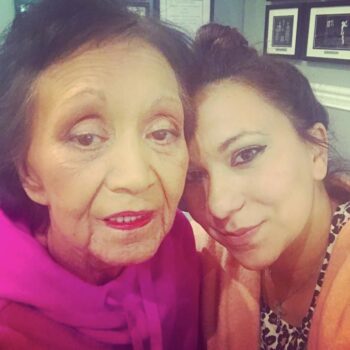Mary Edwards-Olson

There were days I thought she was being lazy or difficult on purpose, and I would get so upset. It breaks my heart I ever thought that. In those moments, please remember—it’s the disease. Your loved one is in there, scared and confused.
December 22nd, 2017
Mary Edwards-Olson was a caregiver for her mother, who had Alzheimer’s disease. She wrote When the Sun Shines Through, a children’s book in honor of her mother, to explain Alzheimer’s and to shed light on what it’s like to have a loved one with Alzheimer’s.
Caring for my mother was a roller coaster of emotions. I went from crying so hard that every inch of my body ached to being so overwhelmed with joy when a piece of her shone through the mask of Alzheimer’s. It was hard as a caretaker to understand that Mom wasn’t Mom anymore in terms of behavior. There were days I thought she was being lazy or difficult on purpose, and I would get so upset. Now, it breaks my heart that I ever thought that. It was the disease. In those moments, please remember—it’s the disease. Your loved one is in there, scared and confused. Show compassion and remember to take time for yourself. As caretakers, we often take a back seat. Remember your loved one needs you to be happy, as well as emotionally and physically healthy. He or she may not express these feelings, but your loved one understands.
A specific challenge we faced was Mom not sleeping at night. On some days, she would not sleep for over 48 hours, other than taking a brief nap. I have two toddlers and my dad worked full time. We had a little help during the day but we tried to do it all for the most part. It took its toll. I told my dad, “I’m either going to lose both my parents or we have to try assisted living.” Fortunately, he agreed and Mom flourished in her new residence. Dad got healthy again, and we were able to be more of a family than just caretakers, which we felt we had become.
Although our biggest challenge was putting Mom in assisted living, we made the decision to do so because putting Mom in didn’t mean we couldn’t take her out. We could always bring her home. We were beyond blessed to have found the perfect place for her on our first try. We found a beautiful facility full of caretakers that truly loved Mom. Because of the extra care and socialization they provided, I believe Mom was happier and that she lived longer because of this experience. I believe socialization is so important for anyone suffering from a memory illness. Dad and I still saw her almost every day, but if we couldn’t get there, we knew she was well cared for. She passed in the comfort of her room in the arms of myself and my father. She never suffered—no bed sores, no broken bones. For this, I’m grateful. She slowly left us, but did so with grace and peace.
I haven’t and don’t know if I’ll ever deal with all the stages I saw Mom go through with this disease, and that’s OK. I’m just at peace because she went so peacefully. It’s okay to feel all the emotions while watching a loved one suffer and ultimately lose his or her life to Alzheimer’s. I would just say: Stay mentally strong, and don’t let this disease take you, too. Find a positive activity to put your energy into when you’re feeling down. Your loved one needs you to be his or her shoulder. As a daughter, I knew it was my Mom’s time, even when people said she had more time. I knew our days were limited. The night before she died, I whispered that she could go. I told her we would miss her more than she would ever know, but we would be OK. I’m hoping that she understood me and that gave her peace.